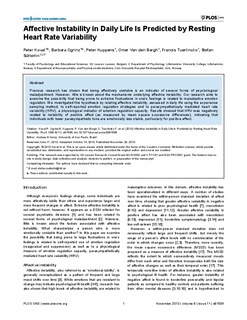Affective Instability in Daily Life Is Predicted by Resting Heart Rate Variability
Ogrinz, Barbara; Koval, Peter; Kuppens, Peter; Van den Bergh, Omer; Tuerlinckx, Francis; Sütterlin, Stefan
Journal article, Peer reviewed
Permanent lenke
http://hdl.handle.net/11250/220489Utgivelsesdato
2013Metadata
Vis full innførselSamlinger
Originalversjon
10.1371/journal.pone.0081536Sammendrag
Previous research has shown that being affectively unstable is an indicator of several forms of psychological
maladjustment. However, little is known about the mechanisms underlying affective instability. Our research aims to
examine the possibility that being prone to extreme fluctuations in one’s feelings is related to maladaptive emotion
regulation. We investigated this hypothesis by relating affective instability, assessed in daily life using the experience
sampling method, to self-reported emotion regulation strategies and to parasympathetically mediated heart rate
variability (HRV), a physiological indicator of emotion regulation capacity. Results showed that HRV was negatively
related to instability of positive affect (as measured by mean square successive differences), indicating that
individuals with lower parasympathetic tone are emotionally less stable, particularly for positive affect.
